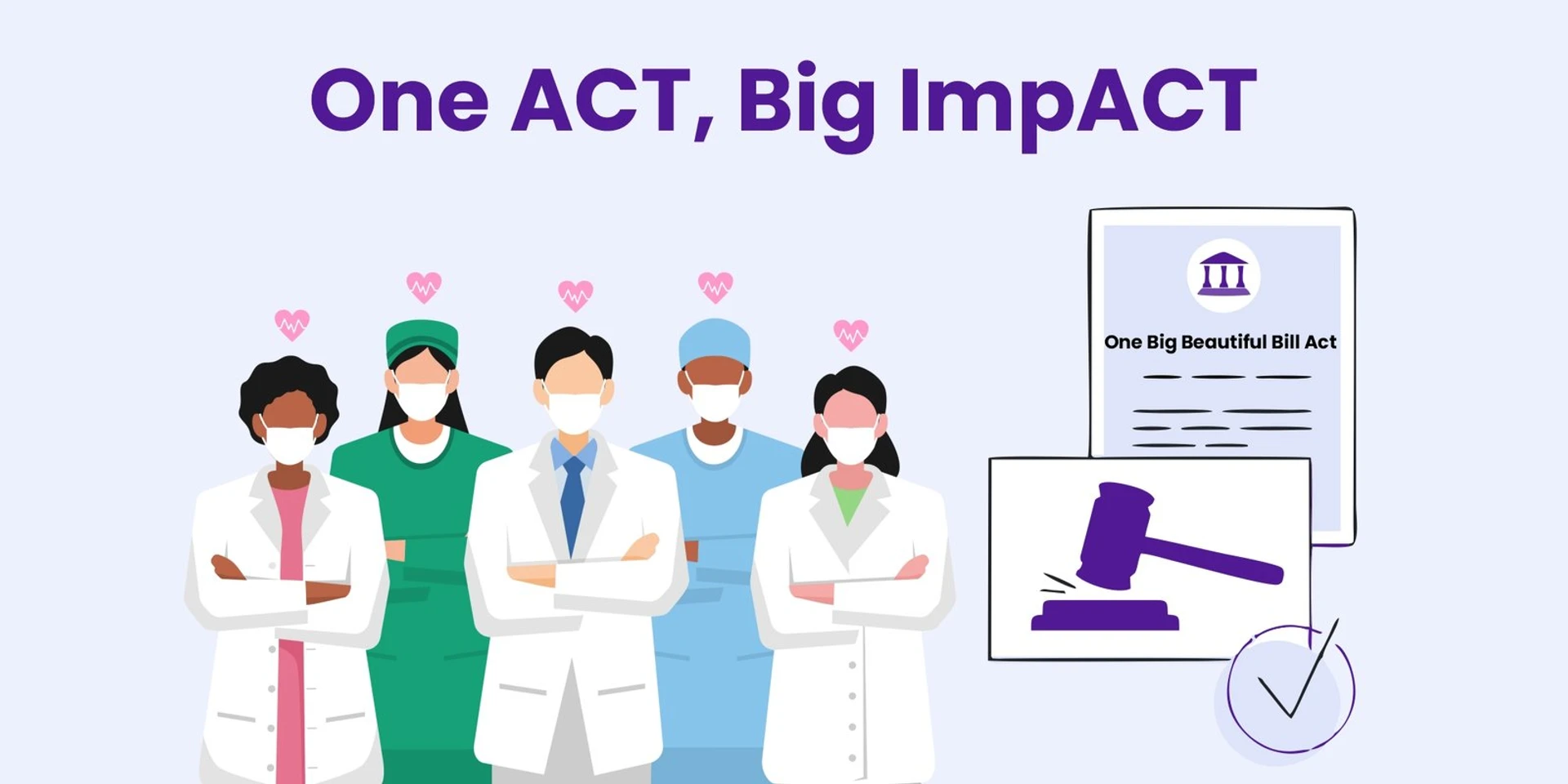So, we cannot not talk about the OBBBA.
It probably is the single-most impactful piece of legislation from a healthcare standpoint since Obamacare and no, this is not an equivalence, just a statement of scale. All politics aside, this bill (now Act) touches YOUR world whether you are a healthcare consumer or a solo practitioner or a large health system.
I would like to break this down using a 3×3 grid – 3 biggest ways the One Big Beautiful Bill Act (OBBBA) will/could impact you as:
- A healthcare consumer
- A solo healthcare provider or a small provider group
- A large health system
Let’s get going.
For healthcare consumers
- Medicaid eligibility will be tougher, period.
- For the purposes of this piece, we will disregard the back and forth that happened to get the OBB Bill passed in time and how different sides or even different States wanted a little bit different. As the dust settles, what has emerged – for sure – is that it will be tougher to qualify for and retain Medicaid eligibility, with more frequent determinations, increased paperwork, and stricter criteria. What it translates into for the population, and the country at large, is a matter of great politicking right now. But far fewer people having access to medical care is enough to get alarm bells going.
- Greater co-pays and possibly more “surprise” bills
- As it stands today, States will have greater control over the decision to restrict retrospective Medicaid coverage. Simply put, you could be uninsured – to begin with – on the day of service and then go on to qualify for Medicaid to cover the entire month and yet be responsible for that initial expense.
- More states appear to be on their way to levying co-pays on Medicaid plans.
- Employer-sponsored plans will not, not be affected
- Employer-sponsored plans will most likely see a ripple effect caused by increased enrolment costs. As more people lose Medicaid (or ACA) coverage, we might just see a higher enrolment in employer plans. Higher enrolment costs and a sicker risk pool will all but guarantee higher premiums.
- Medicaid eligibility will be tougher, period.
For solo healthcare providers and smaller practices
- Greater uninsured population could mean costlier unpaid bills
- Geography will come back to hit ‘em. A steep rise in the uninsured population will mean rising self-pay bills which – as recent history tells us – will not translate into proportionate revenue.
- More complex eligibility verification process
- With greater stipulations around Medicaid coverage, the number of steps in the “due diligence” will go up making it more time consuming and therefore, more expensive to run a medical practice.
- Healthcare will get expensive
- Reduced insured patient population and a higher cost to collect per claim will almost force them to raise costs to be able to make the same amount of money. And this is easier said than done, because they have little to no leverage to negotiate better contract rates from the payers.
- Greater uninsured population could mean costlier unpaid bills
-
For large health systems
-
- Disproportionate rise in ED utilization
- You have a rising uninsured population on the one hand and you are federally required to deliver emergency care – this will most certainly increase bad debt and impact the charity care reserves for most health systems.
- Uncertain payer-mix and what it will impact
- I don’t know enough about this to say what will most likely happen but with significant shifts in insurance coverage, we are in uncharted territory to see what it does across different service lines. This isn’t just about payer mix, and case-mix index but also about risk adjustment for the larger population and how this impacts capitation and value-based care models.
- Provider taxes and State-directed payments
- Most health systems receive extra money through these programs to help cover the gap between what care truly costs and what Medicaid actually pays. With revised limits, a major funding source will be depleting and will impact all health systems, but some a lot more than others.
- Disproportionate rise in ED utilization
Why do I choose to choose optimism?
Simply because chaos has often led to growth and unimaginable improvement in the past.
- Technology will be a true differentiator
- While it might be a support system now, it will emerge as a true differentiator with its ability to contribute in clinical, operations and revenue cycle domains.
- States now have a greater room to operate and innovate
- Not every State is going to respond to OBBBA the same way. We wait to see States come up with smarter designs and protocols to support both patients and providers.
- Value-based care just got a shot in the arm
- This whole chain of events – if done right – could accelerate our shift to care-based models, something that rewards outcomes and not throughput.
- Technology will be a true differentiator
So yes, it is here and it is real. It is forcing us to change how we think about Healthcare – access, delivery and funding – in a new way. And I’d be damned if I didn’t believe in our ability to adapt.






